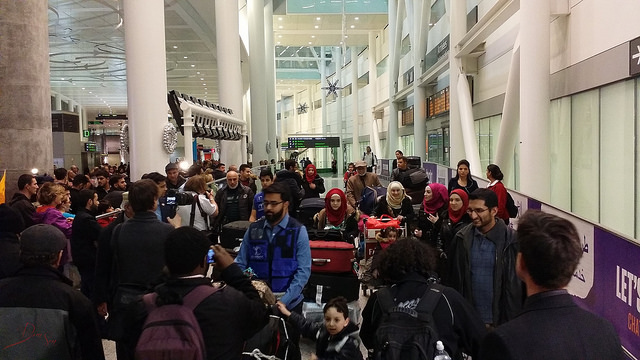Like this article? rabble is reader-supported journalism. Chip in to keep stories like these coming.
The photo of Alan Kurdi, the young Syrian boy, laying face down on a beach captured the attention of the world. The newly elected Prime Minister Justin Trudeau and his Liberal government pledged to bring 25,000 Syrian refugees to Canada by the end of February 2016.
However, millions of Syrian refugees remain vulnerable and displaced, living in camps in Jordan, Lebanon and Turkey. The horror stories about the Syrian civil war and the resulting refugee crisis left many Canadian wondering how they can help.
Canada is the only country in the world that allows private individuals to sponsor refugee applicants to relocate permanently.
The law
Canada is unique in offering individual citizens the opportunity to participate in humanitarian-type immigration by offering them a mechanism for sponsoring refugees.
Colloquially referred to as “Group of Five” sponsorship, five individuals can apply together to sponsor a refugee. There also can be more than five sponsors as part of the group.
These individuals, or “sponsors,” must be either Canadian citizens or permanent residents, they must be over 18 years old and they must either live in the area where the refugee will settle, or have representatives there. They must agree to support the refugee both emotionally and financially for the sponsorship period, which usually for one year.
The Syrian and Iraqi exception to the UNHCR recognition requirement
For the refugee, or “applicant,” the principal applicant must already have refugee status. Family members or “dependents” must be included in the application. (Note that Quebec has its own refugee selection process.)
The government of Canada, due to the current refugee crisis in the Middle East, has waived the requirement that individuals who are sponsored to come to Canada as refugees and are from Iraq and Syria have to be recognized by the United Nations High Commissioner for Refugees (UNHCR). The waiver is good for one year and expires on September 19, 2016.
Finally, in order to qualify to come to Canada, applicants must pass medical, criminal and security admissibility checks. With some exceptions, they are also assessed on their ability to establish themselves successfully in Canada. If they are in urgent need of protection, or are vulnerable, they may not be assessed on this last point.
The application process
The Group of Five sponsors should be able to provide an amount that is roughly equivalent to the local social assistance rate. The Sponsorship Cost Table provides a guideline for estimating the costs of sponsoring a refugee for 12 months.
For a family of four, 12 months of income support would be roughly $20,000 plus estimated start-up costs of $7,000 for a total estimated annual settlement cost of $27,000.
After arrival
Sponsors take on significant responsibilities when they apply to bring a refugee and their family to Canada. The sponsors are responsible for providing the group with care, lodging, settlement assistance and support for either the sponsorship period, usually 12 months, or until the refugee is self-sufficient.
The government lists what sponsors normally provide including: food, rent, utilities, clothing, furniture, help finding a family doctor and dentist, help applying for health care and enrolling children in school and help finding language training. They should also help with introducing newcomers to people with similar interests, help them become oriented to their communities and help with their employment search.
The reasons for wanting to bring a refugee and their family to Canada are many. The sponsors could be relatives or friends of the refugees. The sponsors could have ethnic or cultural connections to the refugees. They could simply be a group of individuals with a shared sense of humanity and wishing to help vulnerable people. Whatever the reason, Canada offers a unique opportunity to take direct action.
As with all types of immigration applications, it can be useful to have guidance and assistance throughout the process from a legally trained professional.
Patti Kemp is a member of the Law Society of England and Wales and the Law Society of Upper Canada. She trained and practiced at Birnberg Peirce & Partners in London, England. She works part-time time at Ed Corrigan Law Office in London, Ontario. She can be reached at [email protected]”>[email protected].
Edward C. Corrigan is certified as a specialist by the Law Society of Upper Canada in Citizenship, Immigration and Immigration and Refugee Law. His office is located in London Ontario at 383 Richmond Street Suite 902, tel. 519-439-4015. He can be reached at [email protected].
Photo: flickr/ Domnic Santiago



